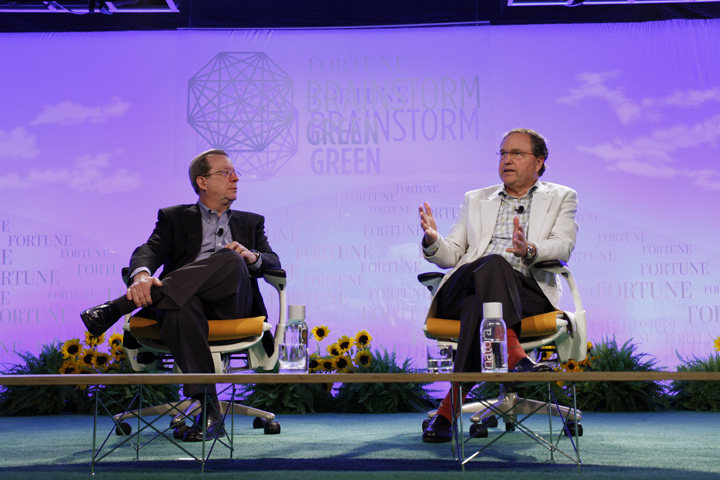
For the past three years Fortune Magazine has put together an annual conference called The Green Brainstorm, gathering captains of industry, venture capitalists, sustainability experts, NGO's and innovators to brainstorm about environmental issues and devise ways to address them. This year's meeting in Laguna Niguel just concluded. It was a Fortune event, so the emphasis was on how business can contribute to a healthy, stable and sustainable environment.
There are plenty of conferences held around the environment and its problems, but with more political gamesmanship being played than solutions being implemented. What distinguishes this event is that it focuses on solutions, and largely sets aside pointless ideological debates.
Over three days, the topics included; the electric car, sustainability through innovation, the Smart Grid (sounds like a good idea), geo-engineering, and solutions to unsustainable population growth.
The line-up of speakers included some people the general public never heard of who nonetheless have very impressive credentials, as well as some business super stars. A partial list; Wal- Mart's Lee Scott, Architect Bill Mc Donough, Ford Motor Company chairman, Bill Ford, legendary venture capitalist Vinod Khosla and Sylvia Earle.
The tone was can-do optimistic, avoiding the wishfulness and idealized trappings that so often seem delusional in retrospect in favor of pragmatism. Judging by the many venture capitalists that showed up, it seems the business community is interested in sustainability. It is pretty simple: Without sustainability, nobody can make plans, and without plans, it is very hard to do business, at least in a way that is intelligent over the long term.
During a conversation with Time editor in chief John Huey, Lee Scott explained that Wal-Mart's commitment to sustainability was not fueled by altruism. In 2006, Scott committed the company to three ambitious goals; to be supplied 100 percent by renewable energy, to create zero waste, and to sell products that sustain Wal-Mart's resources and the environment. They decided this because it made economic sense to them at the time. Critics might agree Wal-Mart's professed lack of altruism is borne out by their less-than-progressive workplace policies, but on environmental issues, they are way ahead of the curve.
Have we been marginalizing environmental concerns by fostering the notion that promoting environmental sustainability is a charitable, altruistic choice, rather than a practical self-serving one? Environmental leaders are becoming aware that the charity model does not compete well in an age when dire immediate human need is brought on by disaster and strife. Only if environmental health is regarded as a necessity, rather than a luxury or a good cause, do we start to own the problems rather than just shake our head at them.
Among progressives, self-interest is sometimes treated as a tarnished motive. And among hard-nosed business types, causes and charities move to the back of the line. Both attitudes may be contributing to a missed opportunity to make sustainability a non-partisan effort in which anyone can find a reason to be personally invested. If everyone starts to own sustainability, environmental activism will shed its stereotypes of elitist tree-hugging and liberal attacks on competitiveness. Many environmental leaders have acknowledged the need to change the way they talk about the environmental problem and move beyond the common misperceptions that suggest it's about the polar bears, saving trees, and supporting Al Gore.
Sea World's Julie Scardina made an eloquent point comparing our planet to the fictional Pandora in the movie Avatar. "Our planet is even more amazing than Pandora," she said. I loved Avatar, and would probably move in a heartbeat to Pandora, where everything seems so magical and interconnected. It's hard not to long for that closeness to the beauty of nature. But wait: Pandora is a fiction. Our planet is far more amazing because it is real and every bit as interconnected and magical. The grass is not greener on Pandora. The grass on Pandora got its idea from the real thing.
Explorer Sylvia Earle, during her inspiring talk about the necessity to protect our oceans, said "I am pleased to see that business leaders are thinking green and that Green Leaders are thinking business but it's important we start thinking blue. We have to treat the oceans as if our lives depended on it, because they do." With survival in the balance, there is no reason for environmental sustainability to continue to carry an ideological stigma.
